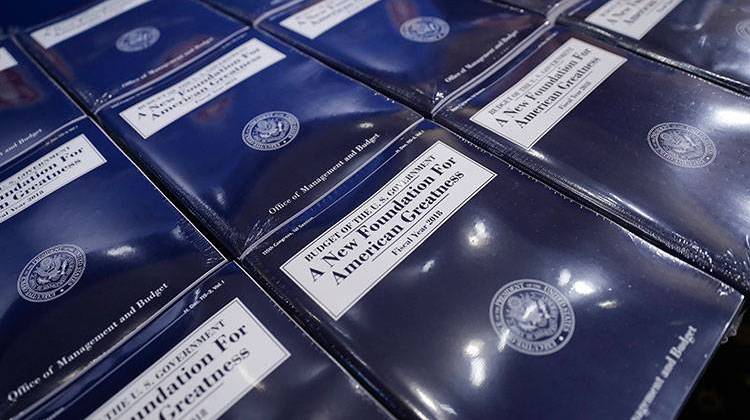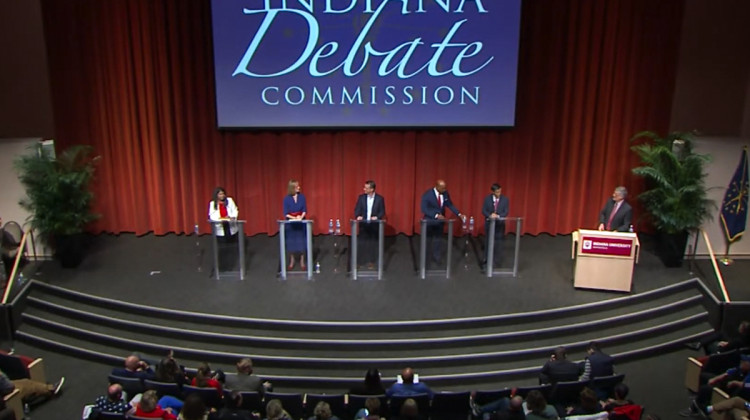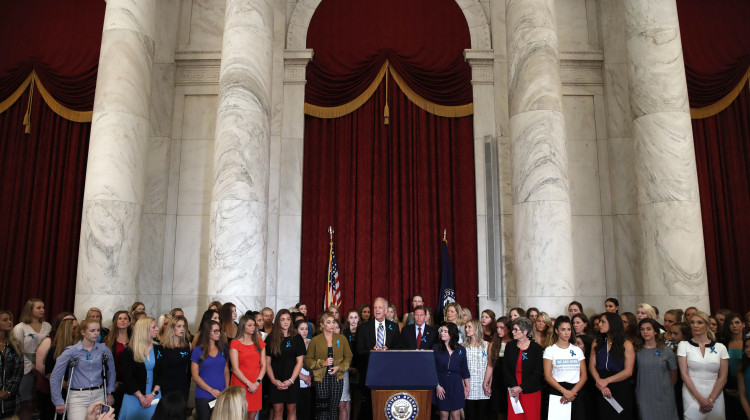
The Trump administration's proposal for fiscal year 2018 includes significant cuts to anti-poverty programs, part of an ambitious attempt to balance the federal budget in the next 10 years.
AP Photo/Pablo Martinez MonsivaisThe Trump administration unveiled its first full budget proposal on Tuesday. You can read the full document right here.
The budget calls for significant cuts to numerous federal assistance programs aimed to help the poor. The reductions, along with a series of tax cuts, are part of an ambitious attempt from the administration to balance the federal budget in the next 10 years.
Steve Russell, a professor of economics at IUPUI, says the goal is unrealistic.
“They assume a rate of economic growth that most economists would say it likely to be unattainable,” Russell says.
Russell says the administration could balance the budget if the economic growth rate “magically went up to three percent, and stayed there for 10 years." But Russell says that’s almost certainly not going to happen, regardless of the budget that eventually passes.
The White House says the budget's combination of regulatory, tax, and welfare reforms will lead to economic growth.
Funding reductions in the proposal include more than $800 billion from Medicaid, the federal health care program for the poor, $15.6 billion from TANF block grants, a source of cash welfare funding for needy families with children, and $190 billion from SNAP, the food stamp program.
Andrew Bradley, policy analyst for the Institute for Working Families, says one in seven Hoosiers struggle with hunger – one example of an ongoing need that federal programs should address.
“It’s a continuation of what we’re quickly learning to expect from this administration, in that it radically misunderstands the problem of poverty and self-sufficiency in Indiana and the United States,” Bradley says.
The Trump administration, in a statement on the official White House website, says its proposal "reverses the damaging trends from previous administrations by putting our nation's budget back into balance and reducing our debt through fiscally conservative principles, all the while delivering on President Trump's campaign promise not to cut Social Security retirement or Medicare."
The proposal calls for $3.6 trillion in federal spending reductions over the next decade.
Russell says philosophically speaking, the budget is not wildly different than past Republican budgets. He says it’s become a tradition in Republican administrations to promote a budget with promises that rely on unrealistic economic growth.
“The difference here is that the magnitude of the cuts in social programs, and not just social programs, but all sorts of federal programs. It's a little bigger than anybody has done in the past,” Russell says.
Trump’s proposal is just that – a proposal. It will ultimately be up to Congress to pass the budget. Russell suspects that just a small portion of the administration’s plan will make it through, especially considering how politically risky it can be to cut social programs.
Here are some reactions to the budget from public officials in Indiana:
U.S. Senator Joe Donnelly (D-Ind.)
"I support investments in our military and veterans, but I’m deeply concerned by the President’s budget cuts to education, infrastructure, and health care for children and seniors, all of which are critical to Hoosiers. It's up to Congress to consider a budget, and I will continue to work with my colleagues to promote a strong national defense and make the necessary domestic investments in our country to grow Indiana’s middle class, while maintaining fiscal responsibility."
U.S. Rep. Todd Rokita (R-Brownsburg)
"Our nation needs leadership and President Trump and Vice President Pence are providing it by submitting a budget that makes tough decisions—in other words, they lay out priorities. This Administration is striving to make our nation great, now it’s Congress’ time to embark on our Article I duties. We need to stop spending and borrowing beyond our means from China. We need clear priorities like tax reform, protecting our seniors by ensuring states have access to Medicaid block grants, strengthening our infrastructure and economy, and rebuilding our military to confront grave foreign threats and keep Americans safe. Our children and future generations of Americans need us to do our job because they are the ones who will suffer. They will be crushed by our nation’s debt if we do not take action now."
 DONATE
DONATE






 View More Programs
View More Programs


 Support WFYI. We can't do it without you.
Support WFYI. We can't do it without you.